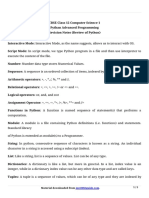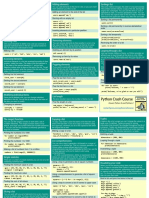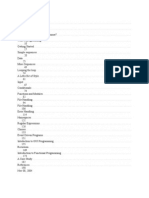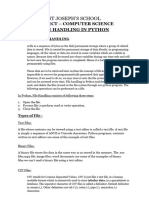0 ratings0% found this document useful (0 votes)
413 viewsBeginners Python Cheat Sheet PCC Files Exceptions PDF
The document discusses various techniques for working with files in Python, including opening, reading from, writing to, appending to, and handling exceptions when working with files. Specifically, it covers:
1) Opening files using absolute and relative paths, and on different operating systems.
2) Reading the entire contents of a file at once or line by line.
3) Writing to new files or appending to existing files.
4) Handling common exceptions like FileNotFoundError and ZeroDivisionError that may occur when working with files.
5) Using try/except blocks to gracefully handle errors instead of crashing.
Uploaded by
booklover2Copyright
© © All Rights Reserved
Available Formats
Download as PDF, TXT or read online on Scribd
0 ratings0% found this document useful (0 votes)
413 viewsBeginners Python Cheat Sheet PCC Files Exceptions PDF
The document discusses various techniques for working with files in Python, including opening, reading from, writing to, appending to, and handling exceptions when working with files. Specifically, it covers:
1) Opening files using absolute and relative paths, and on different operating systems.
2) Reading the entire contents of a file at once or line by line.
3) Writing to new files or appending to existing files.
4) Handling common exceptions like FileNotFoundError and ZeroDivisionError that may occur when working with files.
5) Using try/except blocks to gracefully handle errors instead of crashing.
Uploaded by
booklover2Copyright
© © All Rights Reserved
Available Formats
Download as PDF, TXT or read online on Scribd
You are on page 1/ 2
Storing the lines in a list Opening a file using an absolute path
filename = 'siddhartha.txt' f_path = "/home/ehmatthes/books/alice.txt"
with open(filename) as f_obj: with open(f_path) as f_obj:
lines = f_obj.readlines() lines = f_obj.readlines()
for line in lines: Opening a file on Windows
Windows will sometimes interpret forward slashes incorrectly. If
print(line.rstrip())
you run into this, use backslashes in your file paths.
f_path = "C:\Users\ehmatthes\books\alice.txt"
Your programs can read information in from files, and Passing the 'w' argument to open() tells Python you want to
they can write data to files. Reading from files allows with open(f_path) as f_obj:
write to the file. Be careful; this will erase the contents of lines = f_obj.readlines()
you to work with a wide variety of information; writing the file if it already exists. Passing the 'a' argument tells
to files allows users to pick up where they left off the Python you want to append to the end of an existing file.
next time they run your program. You can write text to
files, and you can store Python structures such as Writing to an empty file When you think an error may occur, you can write a try-
lists in data files. filename = 'programming.txt' except block to handle the exception that might be raised.
The try block tells Python to try running some code, and the
with open(filename, 'w') as f: except block tells Python what to do if the code results in a
Exceptions are special objects that help your
f.write("I love programming!") particular kind of error.
programs respond to errors in appropriate ways. For
example if your program tries to open a file that Writing multiple lines to an empty file Handling the ZeroDivisionError exception
doesnt exist, you can use exceptions to display an try:
informative error message instead of having the filename = 'programming.txt'
print(5/0)
program crash. except ZeroDivisionError:
with open(filename, 'w') as f:
f.write("I love programming!\n") print("You can't divide by zero!")
f.write("I love creating new games.\n") Handling the FileNotFoundError exception
To read from a file your program needs to open the file and
Appending to a file f_name = 'siddhartha.txt'
then read the contents of the file. You can read the entire
contents of the file at once, or read the file line by line. The filename = 'programming.txt'
with statement makes sure the file is closed properly when try:
the program has finished accessing the file. with open(filename, 'a') as f: with open(f_name) as f_obj:
f.write("I also love working with data.\n") lines = f_obj.readlines()
Reading an entire file at once f.write("I love making apps as well.\n") except FileNotFoundError:
filename = 'siddhartha.txt' msg = "Can't find file {0}.".format(f_name)
print(msg)
with open(filename) as f_obj:
contents = f_obj.read() When Python runs the open() function, it looks for the file in
the same directory where the program that's being excuted
is stored. You can open a file from a subfolder using a It can be hard to know what kind of exception to handle
print(contents) when writing code. Try writing your code without a try block,
relative path. You can also use an absolute path to open
Reading line by line any file on your system. and make it generate an error. The traceback will tell you
Each line that's read from the file has a newline character at the what kind of exception your program needs to handle.
end of the line, and the print function adds its own newline Opening a file from a subfolder
character. The rstrip() method gets rid of the the extra blank lines
this would result in when printing to the terminal.
f_path = "text_files/alice.txt"
filename = 'siddhartha.txt' with open(f_path) as f_obj:
lines = f_obj.readlines()
Covers Python 3 and Python 2
with open(filename) as f_obj:
for line in f_obj: for line in lines:
print(line.rstrip()) print(line.rstrip())
The try block should only contain code that may cause an Sometimes you want your program to just continue running The json module allows you to dump simple Python data
error. Any code that depends on the try block running when it encounters an error, without reporting the error to structures into a file, and load the data from that file the
successfully should be placed in the else block. the user. Using the pass statement in an else block allows next time the program runs. The JSON data format is not
you to do this. specific to Python, so you can share this kind of data with
Using an else block people who work in other languages as well.
Using the pass statement in an else block
print("Enter two numbers. I'll divide them.")
f_names = ['alice.txt', 'siddhartha.txt', Knowing how to manage exceptions is important when
x = input("First number: ") 'moby_dick.txt', 'little_women.txt'] working with stored data. You'll usually want to make sure
y = input("Second number: ") the data you're trying to load exists before working with it.
for f_name in f_names: Using json.dump() to store data
try: # Report the length of each file found.
result = int(x) / int(y) try: """Store some numbers."""
except ZeroDivisionError: with open(f_name) as f_obj:
print("You can't divide by zero!") lines = f_obj.readlines() import json
else: except FileNotFoundError:
print(result) # Just move on to the next file. numbers = [2, 3, 5, 7, 11, 13]
pass
Preventing crashes from user input else: filename = 'numbers.json'
Without the except block in the following example, the program with open(filename, 'w') as f_obj:
num_lines = len(lines)
would crash if the user tries to divide by zero. As written, it will
handle the error gracefully and keep running. msg = "{0} has {1} lines.".format( json.dump(numbers, f_obj)
f_name, num_lines)
"""A simple calculator for division only.""" print(msg)
Using json.load() to read data
"""Load some previously stored numbers."""
print("Enter two numbers. I'll divide them.")
print("Enter 'q' to quit.") import json
Exception-handling code should catch specific exceptions
while True: that you expect to happen during your program's execution. filename = 'numbers.json'
x = input("\nFirst number: ") A bare except block will catch all exceptions, including with open(filename) as f_obj:
if x == 'q': keyboard interrupts and system exits you might need when numbers = json.load(f_obj)
break forcing a program to close.
y = input("Second number: ") print(numbers)
if y == 'q': If you want to use a try block and you're not sure which
break exception to catch, use Exception. It will catch most Making sure the stored data exists
exceptions, but still allow you to interrupt programs
intentionally. import json
try:
result = int(x) / int(y) Dont use bare except blocks f_name = 'numbers.json'
except ZeroDivisionError:
print("You can't divide by zero!") try:
try:
else: # Do something
with open(f_name) as f_obj:
print(result) except:
numbers = json.load(f_obj)
pass
except FileNotFoundError:
Use Exception instead msg = "Cant find {0}.".format(f_name)
Well-written, properly tested code is not very prone to print(msg)
try: else:
internal errors such as syntax or logical errors. But every # Do something
time your program depends on something external such as print(numbers)
except Exception:
user input or the existence of a file, there's a possibility of pass
an exception being raised. Practice with exceptions
Printing the exception Take a program you've already written that prompts for user
It's up to you how to communicate errors to your users. input, and add some error-handling code to the program.
Sometimes users need to know if a file is missing; try:
sometimes it's better to handle the error silently. A little # Do something
except Exception as e: More cheat sheets available at
experience will help you know how much to report.
print(e, type(e))
You might also like
- Beginners Python Cheat Sheet PCC If While PDFNo ratings yetBeginners Python Cheat Sheet PCC If While PDF2 pages
- Name - Grade - / 32: National 5 Computing Homework100% (1)Name - Grade - / 32: National 5 Computing Homework4 pages
- 12 Comp Sci 1 Revision Notes Pythan Advanced ProgNo ratings yet12 Comp Sci 1 Revision Notes Pythan Advanced Prog5 pages
- Beginners Python Cheat Sheet PCC Classes PDF100% (1)Beginners Python Cheat Sheet PCC Classes PDF2 pages
- Beginners Python Cheat Sheet PCC Pygal PDFNo ratings yetBeginners Python Cheat Sheet PCC Pygal PDF2 pages
- QNX Persistent Publish Subscribe Developers Guide PDFNo ratings yetQNX Persistent Publish Subscribe Developers Guide PDF154 pages
- How To Set Qweb Report Table Height If Use T-Foreach Loop in Odoo12 OdooNo ratings yetHow To Set Qweb Report Table Height If Use T-Foreach Loop in Odoo12 Odoo7 pages
- Python Cheat Sheet by Runnko - Download Free From Cheatography - Cheatography - Com - Cheat Sheets For Every OccasionNo ratings yetPython Cheat Sheet by Runnko - Download Free From Cheatography - Cheatography - Com - Cheat Sheets For Every Occasion13 pages
- How To Integrate Google Drive With OdooNo ratings yetHow To Integrate Google Drive With Odoo13 pages
- Discrete Structure Notes by Samujjwal Bhandari100% (2)Discrete Structure Notes by Samujjwal Bhandari151 pages
- C++ Cheatsheet (Inc. C++2011) Cheat Sheet: by ViaNo ratings yetC++ Cheatsheet (Inc. C++2011) Cheat Sheet: by Via2 pages
- NMAP Commands Cheat Sheet and Tutorial With ExamplesNo ratings yetNMAP Commands Cheat Sheet and Tutorial With Examples21 pages
- Research On SQL Injection Attack and Prevention Technology Based On WebNo ratings yetResearch On SQL Injection Attack and Prevention Technology Based On Web4 pages
- Using Transparency To Enhance Responsiveness and Trust in Local Government: Can It Work?No ratings yetUsing Transparency To Enhance Responsiveness and Trust in Local Government: Can It Work?9 pages
- How To Import JSON To Excel Using VBA - Excelerator SolutionsNo ratings yetHow To Import JSON To Excel Using VBA - Excelerator Solutions15 pages
- Xii Cs Question Bank For Bright Students Chapter Wise Set-IINo ratings yetXii Cs Question Bank For Bright Students Chapter Wise Set-II40 pages
- The Illustrated Word2vec - Jay Alammar - Visualizing Machine Learning One Concept at A Time100% (1)The Illustrated Word2vec - Jay Alammar - Visualizing Machine Learning One Concept at A Time24 pages
- Win32com - Goermezer.de-The Python Script Collection For Windows - Controlling Applications Via SendkeysNo ratings yetWin32com - Goermezer.de-The Python Script Collection For Windows - Controlling Applications Via Sendkeys3 pages
- 7 Beginners - Python - Cheat - Sheet - PCC - Files - Exceptions PDFNo ratings yet7 Beginners - Python - Cheat - Sheet - PCC - Files - Exceptions PDF2 pages
- Iomirror E3210 User'S Manual: Third Edition, May 2014No ratings yetIomirror E3210 User'S Manual: Third Edition, May 201442 pages
- Honeywell R22 To R448A Retrofit Guideline v1No ratings yetHoneywell R22 To R448A Retrofit Guideline v112 pages
- Beginners Python Cheat Sheet PCC Matplotlib PDF100% (1)Beginners Python Cheat Sheet PCC Matplotlib PDF2 pages
- Beginners Python Cheat Sheet PCC Testing PDFNo ratings yetBeginners Python Cheat Sheet PCC Testing PDF2 pages
- Beginners Python Cheat Sheet PCC Functions PDFNo ratings yetBeginners Python Cheat Sheet PCC Functions PDF2 pages
- Beginners Python Cheat Sheet PCC Pygame PDFNo ratings yetBeginners Python Cheat Sheet PCC Pygame PDF2 pages
- Valve Body W9 Type T General: ART. NO. 850001No ratings yetValve Body W9 Type T General: ART. NO. 8500012 pages
- Lecture3-Inode Table Content and InodeConversionNo ratings yetLecture3-Inode Table Content and InodeConversion33 pages
- Side - Panel Spark-Concepts - xPro-V5 Wiki GitHubNo ratings yetSide - Panel Spark-Concepts - xPro-V5 Wiki GitHub11 pages
- Fieldbus Interface Module for Ethernet REV CNo ratings yetFieldbus Interface Module for Ethernet REV C36 pages
- 4 Ways To Create and Delete Files and DirectoriesNo ratings yet4 Ways To Create and Delete Files and Directories2 pages
- CMU-CS 303 - Fundamentals of Computing 1 - 2020S - Lecture Slides - 7-2No ratings yetCMU-CS 303 - Fundamentals of Computing 1 - 2020S - Lecture Slides - 7-255 pages
- ICT ContactCenterServices 9 Q3 LAS1 FINALNo ratings yetICT ContactCenterServices 9 Q3 LAS1 FINAL8 pages
- Python (3) Leaflet: Roland Becker December 16, 2020No ratings yetPython (3) Leaflet: Roland Becker December 16, 202015 pages













































































































